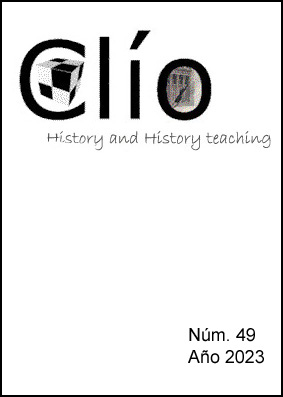Memory and representation of the expansion through East Asia and World War II in the majority-used history textbooks of Secondary Education in Japan: Documentary analysis
DOI:
https://doi.org/10.26754/ojs_clio/clio.2023499547Keywords:
Textbooks, Secondary education, Japan, History, Memory, War, Content, Documentary AnalysisAbstract
Several studies have focused on the controversies that arose almost two decades ago when revised history textbooks were approved, didactic materials that were of minor use in Japan. Taking this background into account and from a qualitative approach, a research of documentary sources analysis is carried out to understand the representation of sensitive issues in the history textbooks of majority use in Japan in relation to expansion in East Asia and the Second World War. To this end, after selecting the Japanese history textbooks from Tokyo prefecture most used in secondary schools, a comparative documentary analysis is carried out. This analysis is structured into a series of categories that include some sensitive episodes from the Second Sino-Japanese War and the Asia-Pacific War. This research concludes that contents considered controversial from a predominantly aseptic perspective are included.
Downloads
References
Asahi Shimbun (2022). Publishers revise textbook phrases about ‘forced’ Korean laborers. March 30, 2022. https://www.asahi.com/ajw/articles/14585864
Bukh, A. (2007). Japan's History Textbooks Debate: National Identity in Narratives of Victimhood and Victimizatio. Asian Survey, 47(5), 683-704. https://doi.org/10.1525/as.2007.47.5.683
Burns, S. (2003). Before the Nation: Kokugaku and the Imagining of Community in Early Modern Japan. Duke University Press.
Cave, P. (2012). Japanese Colonialism and the Asia-Pacific War in Japan’s History Textbooks: Changing representations and their causes. Modern Asian Studies, 47 (2), 542-580. https://doi.org/10.1017/S0026749X11000485
Delgado-Algarra, E. J. (2018). Chapter 8. Education for Citizenship and Social Studies in Japan: Historical Evolution and Challenges for a Cosmopolitan Identity. En Pineda, J. A., De Alba-Fernández, N. and Navarro-Medina, E. (Eds.). Handbook of Research on Education for Participative Citizenship and Global Prosperity (pp. 172-194). IGI Global. https://doi.org/10.4018/978-1-5225-7110-0.ch008
Delgado-Algarra, E. J., Aguaded, I., Bernal-Bravo, C. y Lorca-Marín, A. A. (2020). Citizenship and Pluriculturalism Approaches of Teachers in the Hispanic and Japanese Contexts: Higher Education Research. Sustainability, 12 (8). 3109. https://doi.org/10.3390/su12083109
Delgado-Algarra, E. J., Bernal-Bravo, C. y Lorca-Marín, A. A. (2019). Multicultural competence and Cosmopolitan citizenship in the Hispanic-Japanese context of Higher Education. Journal of New Approaches in Educational Research (NAER Journal), 8(2), 166-183. https://doi.org/10.7821/naer.2019.7.425
Delgado-Algarra, E. J. y Estepa, J. (2015). Memoria histórica y olvido en la enseñanza de la historia: los casos de Japón e Italia. Didáctica de las Ciencias Experimentales y Sociales, 29, 119-133. https://doi.org/10.7203/dces.29.4357
Dumbar, Y. (2023). History Education in Contemporary Japan: An Examination of Junior High School Teaching About Imperialism and War. Doctoral Thesis. The University of Manchester.
Estepa, J. y Delgado-Algarra, E. J. (2021). Educación ciudadana, patrimonio y memoria en la enseñanza de la historia: estudio de caso e investigación-acción en la formación inicial del profesorado de secundaria. Revista de investigación en didáctica de las ciencias sociales, 8, 172-189. https://doi.org/10.17398/2531-0968.08.172
Fukiwara, G. y Nosco, F. (2018). The Kokugaku (Native Studies) School. Stanford Encyclopedia of Philosophy. https://plato.stanford.edu/entries/kokugaku- school/#KokuAfteMeij
Guex, S. (2015). The History Textbook Controversy in Japan and South Korea. French Journal of Japanese Studies, 4. https://doi.org/10.4000/cjs.968
Heydemann, G. (2016). La usurpación de la libertad académica y la Universidad de Leipzig: de la zona de ocupación soviética a la RDA 1945-1989/90. Ayer. Revista de Historia Contemporánea, 101(1), 131-157.
Kasahara, T. (2010). Reconciling Narratives of the Nanjing Massacre in Japanese and Chinese Textbooks, Nanjing 1937/ Manila 1945: Remembrance and Reconciliation. University of Hawai.
Kofuze, M. et al. (2017). Shinsen Nipponshi B. Tokyo: Tokyo Shoseki (in Japanese) [trad. Historia de Japón B, Nueva Selección. Educación Secundaria].
Ito, Y. et al (2017). Shin Nipponshi B. Tokyo: Yamakawa shuppansha (in Japanese) [trad. Nueva Historia de Japón B. Educación Secundaria].
Maeda, Y. (2020). Chapter 14: The Effect of Changing Political Contexts on Public Opinion in Japan, 1945–2020. In R. Pekkanen, R. and S. Pekkanen, S. (Eds.), The Oxford Handbook of Japanese Politics (pp. 263-279). Oxford Academic. https://doi.org/10.1093/oxfordhb/9780190050993.013.14
Martí, B. (2007). Orientalismo, japonismo y occidentalismo: Nitobe Inazo y el Bushido. Universidad Autónoma de Madrid y Asociación Española de Orientalistas. https://bit.ly/3dWxkCl
Mejía, W. (2009). What Criticisms are made to the Content of History Science Textbooks? International Seminar History and Social Science Textbook, Santiago de Chile, 11-12 noviembre, Chile, Ministerio de Educación de Santiago de Chile.
Mitani, H. (2012). Los libros de texto en Japón. Cómo se elaboran, autorizan y eligen. http://www.nippon.com/es/in-depth/a00701/
National Security Agency (NSA) (1968). Mokusatsu: One Word, Two Lessons. https://bit.ly/2TgLcQ5
Ogawa, K. (2022). “Historic” Change in Japan’s High School Curriculum: Introducing Modern and Contemporary History. Nippon.com https://shorturl.at/acpW1
Sakuma, A. (2018). The origin of teaching as a profession in Japan: A transnational analysis of the relationship between professionalism and nationalism in the 19th century. Espacio, Tiempo y Educación, 5(2), 35-54. http://dx.doi.org/10.14516/ete.232
Shin, G. W. (2011). History Textbooks, Divided Memories, and Reconciliation. In G.W. Shin and D.C. Sneider (Coords.), History Textbooks and the Wars in Asia: Divided Memories (pp. 3-20). Routledge.
Tohmatsu, H. (2011). Japanese History Texbooks in a Comparative Perspective. In G.W. Shin and D.C. Sneider (Coords.), History Textbooks and the Wars in Asia: Divided Memories (pp. 115-139). Routledge.
Yamaguchi, T. (2017). The "Japan is Great” Boom, Historical Revisionism, and the Government. The Asia-Pacific Journal. Japan Focus, 15(3), 1-7.
Yomiuri Shimbun (2021). School textbooks should be precise in terminology for ‘comfort women’, May 1, 2021. https://japannews.yomiuri.co.jp/editorial/yomiuri-editorial/20210501-64626/
Downloads
Published
How to Cite
Issue
Section
License
Copyright (c) 2023 Emilio José Delgado-Algarra

This work is licensed under a Creative Commons Attribution-NonCommercial-ShareAlike 4.0 International License.
This work is licensed under a Creative Commons Attribution-NonCommercial-ShareAlike 4.0 International License.
Copyright remains the property of authors. Permission to reprint must be obtained from the authors and the contents of JoS cannot be copied for commercial purposes. JoS does, however, reserve the right to future reproduction of articles in hard copy, portable document format (.pdf), or HTML editions of JoS.






